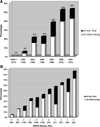Impact of ABO-incompatible listing on wait-list outcomes among infants listed for heart transplantation in the United States: a propensity analysis
- PMID: 20404257
- PMCID: PMC4273502
- DOI: 10.1161/CIRCULATIONAHA.109.885756
Impact of ABO-incompatible listing on wait-list outcomes among infants listed for heart transplantation in the United States: a propensity analysis
Abstract
Background: The purported advantage of ABO-incompatible (ABO-I) listing is to reduce wait times and wait-list mortality among infants awaiting heart transplantation. We sought to describe recent trends in ABO-I listing for US infants and to determine the impact of ABO-I listing on wait times and wait-list mortality.
Methods and results: In this multicenter retrospective cohort study using Organ Procurement and Transplant Network data, infants<12 months of age listed for heart transplantation between 1999 and 2008 (n=1331) were analyzed. Infants listed for an ABO-I transplant were compared with a propensity score-matched cohort listed for an ABO-compatible transplant through the use of a Cox shared-frailty model. The primary end point was time to heart transplantation. The percentage of eligible infants listed for an ABO-I heart increased from 0% before 2002 to 53% in 2007 (P<0.001 for trend). Compared with infants listed exclusively for an ABO-compatible heart, infants with a primary ABO-I listing strategy (n=235) were more likely to be listed 1A, to have congenital heart disease and renal failure, and to require extracorporeal membrane oxygenation. For the propensity score-matched groups (n=197 matched pairs), there was no difference in wait-list mortality; however, infants with blood type O assigned an ABO-I listing strategy were more likely to undergo heart transplantation by 30 days (31% versus 16%; P=0.007) with a less pronounced effect for infants with other blood types.
Conclusions: The proportion of US infants listed for an ABO-I heart transplantation has risen dramatically in recent years but still appears to be preferentially used for sicker infant candidates. The ABO-I listing strategy is associated with a higher likelihood of transplantation within 30 days for infants with blood group O and may benefit a broader range of transplantation candidates.
Figures



Comment in
-
And justice for all: consideration of ABO compatibility in allocation of hearts for infant transplantation.Circulation. 2010 May 4;121(17):1884-6. doi: 10.1161/CIR.0b013e3181e0b032. Epub 2010 Apr 19. Circulation. 2010. PMID: 20404260 Free PMC article. No abstract available.
Similar articles
-
Effect of ABO-incompatible listing on infant heart transplant waitlist outcomes: analysis of the United Network for Organ Sharing (UNOS) database.J Heart Lung Transplant. 2009 Dec;28(12):1254-60. doi: 10.1016/j.healun.2009.06.024. Epub 2009 Sep 26. J Heart Lung Transplant. 2009. PMID: 19782582
-
Outcome of listing for heart transplantation in infants younger than six months: predictors of death and interval to transplantation. The Pediatric Heart Transplantation Study Group.J Heart Lung Transplant. 1997 Dec;16(12):1255-66. J Heart Lung Transplant. 1997. PMID: 9436138
-
Impact on outcomes after listing and transplantation, of a strategy to accept ABO blood group-incompatible donor hearts for neonates and infants.J Thorac Cardiovasc Surg. 2006 Feb;131(2):455-61. doi: 10.1016/j.jtcvs.2005.09.048. J Thorac Cardiovasc Surg. 2006. PMID: 16434278
-
ABO-incompatible organ transplantation.Int J Immunogenet. 2012 Aug;39(4):282-90. doi: 10.1111/j.1744-313X.2012.01101.x. Epub 2012 Feb 18. Int J Immunogenet. 2012. PMID: 22339811 Review.
-
Pushing the boundaries: the current status of ABO-incompatible cardiac transplantation.J Heart Lung Transplant. 2012 Aug;31(8):791-6. doi: 10.1016/j.healun.2012.03.007. Epub 2012 Jun 12. J Heart Lung Transplant. 2012. PMID: 22694850 Review.
Cited by
-
The Case for Cardiac Xenotransplantation in Neonates: Is Now the Time to Reconsider Xenotransplantation for Hypoplastic Left Heart Syndrome?Pediatr Cardiol. 2019 Feb;40(2):437-444. doi: 10.1007/s00246-018-1998-1. Epub 2018 Oct 9. Pediatr Cardiol. 2019. PMID: 30302505 Review.
-
Single center experience with ABO-incompatible and ABO-compatible pediatric heart transplantation.Front Transplant. 2024 Oct 10;3:1452617. doi: 10.3389/frtra.2024.1452617. eCollection 2024. Front Transplant. 2024. PMID: 39449738 Free PMC article.
-
Transplant Tolerance Induction in Newborn Infants: Mechanisms, Advantages, and Potential Strategies.Front Immunol. 2016 Apr 7;7:116. doi: 10.3389/fimmu.2016.00116. eCollection 2016. Front Immunol. 2016. PMID: 27092138 Free PMC article. Review.
-
Emerging science in paediatric heart transplantation: donor allocation, biomarkers, and the quest for evidence-based medicine.Cardiol Young. 2015 Aug;25 Suppl 2(Suppl 2):117-23. doi: 10.1017/S1047951115000918. Cardiol Young. 2015. PMID: 26377718 Free PMC article. Review.
-
Heart transplantation for congenital heart disease in the first year of life.Curr Cardiol Rev. 2011 May;7(2):72-84. doi: 10.2174/157340311797484231. Curr Cardiol Rev. 2011. PMID: 22548030 Free PMC article.
References
-
- McDiarmid S. Death on the pediatric waiting list: scope of the problem. Paper presented at: Summit on Organ Donation and Transplantation; April 19–20, 2007; San Antonio, Tex. 2007.
-
- Patel ND, Weiss ES, Scheel J, Cameron DE, Vricella LA. ABO-incompatible heart transplantation in infants: analysis of the united network for organ sharing database. J Heart Lung Transplant. 2008;27:1085–1089. - PubMed
-
- West LJ, Pollock-Barziv SM, Dipchand AI, Lee KJ, Cardella CJ, Benson LN, Rebeyka IM, Coles JG. ABO-incompatible heart transplantation in infants. N Engl J Med. 2001;344:793–800. - PubMed
-
- Schmoeckel M, Dabritz SH, Kozlik-Feldmann R, Wittmann G, Christ F, Kowalski C, Meiser BM, Netz H, Reichart B. Successful ABO-incompatible heart transplantation in two infants. Transpl Int. 2005;18:1210–1214. - PubMed
Publication types
MeSH terms
Substances
Grants and funding
LinkOut - more resources
Full Text Sources
Medical

